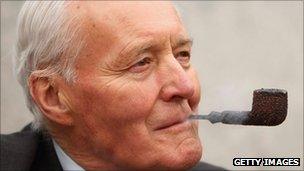Government figures 'wanted to buy BP oil fields'
- Published
The report "Official History of North Sea Oil and Gas" was commissioned by Tony Blair in 1999
Leading government figures wanted to buy the North Sea's major fields from BP when significant discoveries were made in the 1970s, it has been claimed.
Leading oil economist Prof Alex Kemp takes a look back in the newly-published 'Official History of North Sea Oil and Gas'.
The 14,000-page work, based on government papers, gives an insight into successive governments' thinking.
It suggests there was a more "radical" ambition on oil and gas.
Prof Kemp, of the University of Aberdeen, told BBC Scotland: "There was widespread agreement within the Labour government that there should be a national oil company.
"But after Tony Benn became Secretary of State there was a big debate about to what extent the state should control all the issues relating to investment, production and disposal of the oil.
"Tony Benn, with Lord Kearton as the chairman and chief executive of British National Oil Corporation, wanted that corporation to have a very big role indeed and Lord Kearton felt rather unhappy that for some time it was more a paper company than a real company.
"He had quite radical ideas, the most radical of which was to take over all of BP's North Sea assets."
The oil economist said the takeover did not happen for two main reasons; Prime Minister Harold Wilson thought it was a step too far to take over a British company's assets, and compensating firms would have been prohibitively expensive.
Tony Benn explained: "If we had been able to do that it would have meant more money coming to us and greater control of the oil.
"Depletion was very important to us, we were very anxious to see that the oil wasn't depleted so rapidly that you were left with empty fields."
He added: "My relations with the oil companies were perfectly cordial because they knew what I was doing and I told them openly what I was doing and we negotiated as best we could."
'Benefits downplayed'
The two-volume official history was commissioned in 1999 by the then Prime Minister Tony Blair.
It covers licensing, taxation, the role of national oil and gas companies and privatisation.

The UK government tried to prevent "disruption payments" being made directly to Shetland
Prof Kemp said there was evidence in the documents that the benefits of oil to Scotland's economy were "downplayed" to suppress the nationalist movement, which had reached a peak in the 1974 elections.
He said: "Certainly the UK government didn't want to encourage that at all so in any pronouncements the size of the future benefits, like the tax revenues, were certainly not exaggerated."
The book also reveals the UK government's tactics to prevent "disruption payments" for construction of the Sullom Voe terminal being made directly to Shetland Islands Council rather than to the Treasury.
The local authority, which relied heavily on rate support monies from Westminster, was told any funds it received from the oil firms would be offset in the grants.
'Biggest present'
Prof Kemp added: "There was a worry that this could lead to other local authorities all around Scotland saying they should also get a share [of the revenue] so Shetland Council had to dig in their heels and fight quite hard."
The council played it cool, telling the government it was happy not to be included in the oil revolution.
Shetland convener Sandy Cluness, who was a councillor at the time of the negotiations, said: "It was a David and Goliath story to a certain extent but we held all the cards.
"The technology of the day meant that the oil pipelines had to come to the nearest landfall, which was in Sullom, and we knew that so we just had to hang firm and in the end the government gave in."
Other insights include the anger expressed by civil servants when significant discoveries were made on the Norwegian half of the North Sea.
A dividing line had been agreed in 1965 half way between the two countries, even though the UK's shelf extended much further.
Lord Rothschild, head of the central policy and review staff, said the UK had "given Norway the biggest Christmas present in history".
- Published13 September 2011
- Published12 September 2011
- Published7 September 2011
- Published6 September 2011
- Published6 September 2011
- Published25 August 2011
- Published19 August 2011